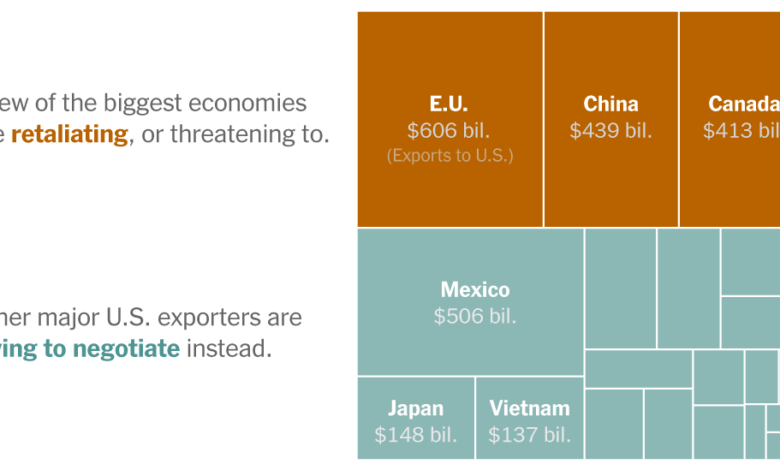How China, Canada and Other Nations are Responding to Trump’s Tariffs

For now, most world leaders are trying to bargain their way out of the sweeping new American tariffs. Just two of the 20 largest exporters to the United States have countered them with new tariffs of their own.
One was China, which said Friday that it would impose a 34 percent import tax on products coming from the United States. That prompted escalation from the Trump administration: Rescind the tax, it warned, or American tariffs on China would go up another 50 percent.
The other was Canada, which last month placed tariffs on a variety of U.S. goods. The European Union, while signalling that it would prefer to negotiate, is said to be working to finalize a list of U.S. goods that it would target.
Other economies — even large ones like Japan and South Korea — don’t have the same leverage, and many are offering concessions. Some are offering to lower their own tariff rates as they try to reach an agreement with the Trump administration.
But it’s unclear how much President Trump wants to negotiate, and a White House trade advisor warned on Monday that even lowering tariffs to zero would not be enough to get the United States to back down.
How major trade partners are responding
| Possible retaliation |
European Union European Union | +20% | $606 bil. |
Preparing to retaliate with wide-ranging levies this week, even as officials also offer concessions and seek to negotiate. |
| No retaliation | Mexico Mexico | +25% * | $506 bil. |
Faces 25 percent tariffs on some imports, but was exempted from the latest round. |
| Retaliated | China China | +34% | $439 bil. |
Matched new tariffs by levying an extra 34 percent duty on U.S. imports. |
| Retaliated | Canada Canada | +25% * | $413 bil. |
Imposed retaliatory tariffs against a number of U.S. goods as it faces duties on some Canadian goods. |
| Japan Japan | +24% | $148 bil. |
Has few options to retaliate, and depends on U.S. military commitments. |
|
| Offered concessions |
Vietnam Vietnam | +46% | $137 bil. |
Offered to reduce tariffs on U.S. imports to zero. |
| South Korea South Korea | +26% | $132 bil. |
Sending its trade minister to Washington for talks. |
|
| Offered concessions |
Taiwan Taiwan | +32% | $116 bil. |
Offering zero tariffs as a starting point for discussion. |
| Offered concessions |
India India | +27% | $87 bil. |
Approved a few concessions in March, like reducing tariffs on bourbon, but has since been relatively silent. |
| United Kingdom United Kingdom | +10% | $68 bil. |
Seeking discussions, while drawing up a list of U.S. products it could potentially hit with retaliatory tariffs. |
|
| Switzerland Switzerland | +32% | $63 bil. |
“Switzerland cannot comprehend” the tariff calculations, its president said — but officials say they will not retaliate. |
|
| Offered concessions |
Thailand Thailand | +37% | $63 bil. |
Offered to increase imports of energy, aircraft and farm products from the U.S. |
| Malaysia Malaysia | +24% | $53 bil. |
Seeking engagement with the U.S., while calling on Asian nations to organize a collective response. |
|
| Singapore Singapore | +10% | $43 bil. |
Officials said they would try to understand U.S. areas of concern. |
|
| Brazil Brazil | +10% | $42 bil. |
Its president said the coiuntry would try to reach an agreement, but is preparing possible retaliatory measures. |
|
| Offered concessions |
Indonesia Indonesia | +32% | $28 bil. |
Offered to buy more U.S. products such as cotton, wheat, oil and gas. |
| Offered concessions |
Israel Israel | +17% | $22 bil. |
Israel had sought to avert the higher rate by voiding duties on American products — seemingly to no avail. |
| Colombia Colombia | +10% | $18 bil. |
Colombia’s president said he would respond to tariffs only if they harmed job creation in the country. |
|
| Turkey Turkey | +10% | $17 bil. |
The trade minister said his country hoped to get the additional tariff lifted. |
|
| Australia Australia | +10% | $17 bil. |
The tariffs have “no basis in logic,” the prime minister said. But he said Australia would not retaliate. |




